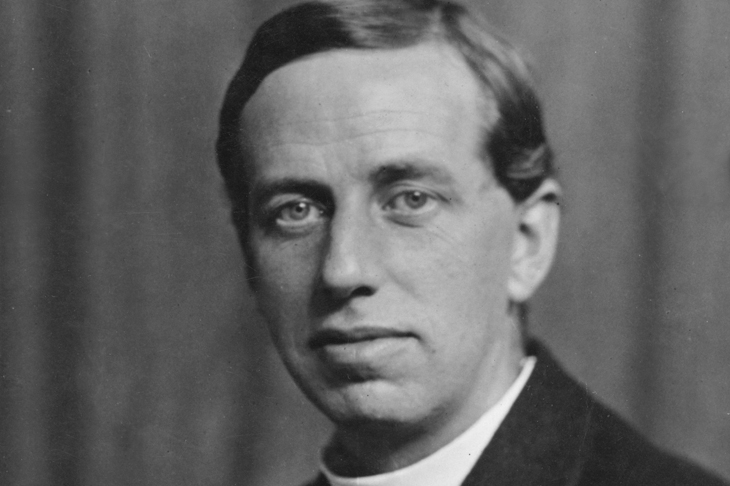During the second world war, while one brother was editing Punch as a national institution (‘Working with him was a little like helping to edit the Journal of Hellenic Studies,’ said a colleague), and another brother, given to asking questions like ‘Which way does a clock go round?’, was breaking codes at Bletchley (as an interlude to piecing together fragments of the Greek low-life mime writer Herodas), Ronald Knox was translating the Bible.
He did this at Aldenham Park, where he lived as a weekend guest who stayed for ten years, thanks to the hospitality of Lord Acton (whose grandfather was the historian) and more particularly Daphne, Lady Acton (whose grandfather had discovered argon), with whom he was sort of in love. There were also 55 evacuated convent girls staying in the house.
‘Sort of’ in love because Knox, or Ronnie as everyone called him, had determinedly switched off the gene that expresses sexuality at the age of 17 when he knelt down in the cloisters at Eton and vowed to God that he would remain celibate all his life, which he did. From a previously unpublished preface, addressed to Sligger Urquhart of Balliol, to his early memoirs, A Spiritual Aeneid (written in 1917 when he was 29), you might think he was in love with all the young men who were killed in the war: ‘Laurence coming back all flushed from playing tennis… or Douglas, in those preposterous trousers, or Julian with hardly any clothes on, cracking his whip’.
Yet nothing improper occurred, then, or during his years, 1926–38, as Catholic chaplain at Oxford. Emotionally, Knox needed the company of a woman, which, after Daphne Acton had gone safely to Rhodesia, Providence found for him in the person of Katharine Asquith, then in her sixties, with whom he stayed from 1947 for the last decade of his life at lovely Mells in Somerset. There he was visited by Evelyn Waugh (‘very mellow and nice’ as Mrs Asquith, unlike so many, called him in her diary), who wrote his biography (1959).
There’s the rub. Waugh portrays Knox as disappointed and ill-used by the Catholic church after his conversion in 1917. Disappointed he might have been, but not at any one thing. He was a melancholiac, if a humorous one. Even at the age of four he would lie awake and ‘think about the past’. The family trait of doing in a difficult manner things that were hardly worth doing (piecing together fragments of Herodas, or in Ronnie’s case punting, not paddling, a canoe) had as its correlative discounting real achievements.
Yet in reality, was a decade as chaplain at Oxford a lesser task than being, say, Bishop of Salford? It might be galling to translate the Bible and then face quibbling objections from churchmen who couldn’t even write a verse of Greek. But most people do not translate the Bible at all, and in the world of English Catholics no one had done so for public use since the Rheims-Douai version of 1582–1610 (unless you count good old Bishop Challoner’s revision, which wisely took covert glances at the Authorised Version).
This habit of discounting has been mistakenly applied to all Knox’s writing. He wrote nothing that lasted, apart from Enthusiasm, that most readable history, from the Circumcellions to the Shakers, of religious eccentricity blown up into heresiarchy by over-inhalation of what was presumed to be a divine afflatus. Oh, and there was Let Dons Delight, a historical satire on Oxbridge common-rooms through the centuries.
And that memoir of his should be excepted, of course, and a stern little book against the atom bomb. Then there are the humorous essays, one proving that ‘In Memoriam’ was written by Queen Victoria, another exploiting the comic heart of an entirely serious attempt by Prebendary George Townsend in 1850 to convert Pius IX to Protestantism. All Knox’s devotional works of popular theology, like The Creed in Slow Motion, are discounted because they only interest believers.
If all those are discounted, we are left with a languid, reticent, witty, quietly holy figure out of one of his own country-house detective novels. So it is welcome to see this collection of essays on Knox (and some previously unpublished writings by him) that insists he should not be discounted. It has grown from a colloquium at Strawberry Hill in 2013. Biographically, new light is shed by Clare Asquith (the Countess of Oxford) on the years at Mells and by Dominic Aidan Bellenger, who traces Knox’s early connections with the Caldey island Benedictines under the ineffably eccentric Abbot Aelred Carlyle.
The editor of the whole caboodle, Francesca Bugliani Knox, married to the cryptographer Knox’s grandson, offers several tempting threads for future Knox scholars to pull at, such as his correspondence with Laurence Eyres, a friend for 46 years. But God forbid that Ronald Knox should become an academic subject. He lived by writing, and he should be read.






Comments